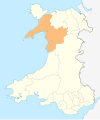Tywyn railway station
 0.105 million
0.105 million 0.102 million
0.102 million 18,204
18,204 58,560
58,560 89,906
89,906Notes | |
|---|---|
Passenger statistics from the Office of Rail and Road |
Tywyn railway station serves the town of Tywyn in Gwynedd, Wales. The station is on the Cambrian Coast Line, with passenger services to Barmouth, Harlech, Porthmadog, Pwllheli, Aberdovey, Machynlleth and Shrewsbury.
History
The line was built by the Aberystwith and Welsh Coast Railway in 1863 and became incorporated in the Cambrian Railways in 1867. Upon the line opening a temporary station was located adjacent to Neptune Road bridge until the present permanent station was completed a few years later.[1] The Welsh romantic poet John Ceiriog Hughes was stationmaster at Tywyn for a brief period in 1870.[2]
In 1922 Cambrian Railways became part of the Great Western Railway and in 1948 following nationalisation operation of the station passed to British Railways Western Region. Until the 1960s there was a summer service between London Paddington and Pwllheli, via Birmingham Snow Hill, Shrewsbury and Machynlleth.
Unlike most stations on the Cambrian Line, Tywyn has retained two platforms and a passing loop. The station however is unstaffed, and the original station buildings remained derelict from the 1980s until the mid-2000s when they were refurbished as offices. In 2013 the building on the up side was in use as a Spiritualist Church.
Facilities
There are no staff at Tywyn, but there are Help Points, announcements and departure boards. There is also a small car park with 20 spaces and a bike rack with six spaces. There are no ticketing facilities either.[3]
Services

As the area was a test bed for the new ERTMS signalling system, services are exclusively operated by Class 158 DMUs; these are the only units operated by Transport for Wales currently equipped for ERTMS operation. On weekdays services are approximately every two hours each way, with most running through to/from Birmingham International via Shrewsbury and Birmingham New Street.[4]
The Talyllyn Railway runs from Tywyn to Abergynolwyn and Nant Gwernol. These services operate from Tywyn Wharf station, which is approximately 300 metres (330 yd) southwards down the road running parallel to the Cambrian line.
| Preceding station |  National Rail National Rail | Following station | ||
|---|---|---|---|---|
| Aberdovey | Transport for Wales Cambrian Coast Line | Tonfanau | ||
| Change for Tywyn Wharf on the Talyllyn Railway | ||||
References
- ^ "Archived copy" (PDF). Archived from the original (PDF) on 7 September 2017. Retrieved 13 June 2017.
{{cite web}}: CS1 maint: archived copy as title (link) - ^ "HUGHES, JOHN (CEIRIOG) (Ceiriog; 1832 - 1887), poet". Dictionary of Welsh Biography. National Library of Wales.
- ^ "National Rail Enquiries - Station facilities for Tywyn".
- ^ Table 76 National Rail timetable, May 2016
External links
 Media related to Tywyn railway station at Wikimedia Commons
Media related to Tywyn railway station at Wikimedia Commons
- Train times and station information for Tywyn railway station from National Rail
- v
- t
- e
| Cambrian Coast Line | |
|---|---|
| Conwy Valley line | |
| North Wales Coast Line |
|

| Bala Lake Railway |
|
|---|---|
| Corris Railway | |
| Fairbourne Railway |
|
| Ffestiniog Railway | |
| Llanberis Lake Railway |
|
| Snowdon Mountain Railway |
|
| Talyllyn Railway | |
| Welsh Highland Railway | |
| Welsh Highland Heritage Railway |
|
 Trains portal
Trains portal Wales portal
Wales portal Transport
Transport Commons
Commons
 | This Wales railway station-related article is a stub. You can help Wikipedia by expanding it. |
- v
- t
- e













